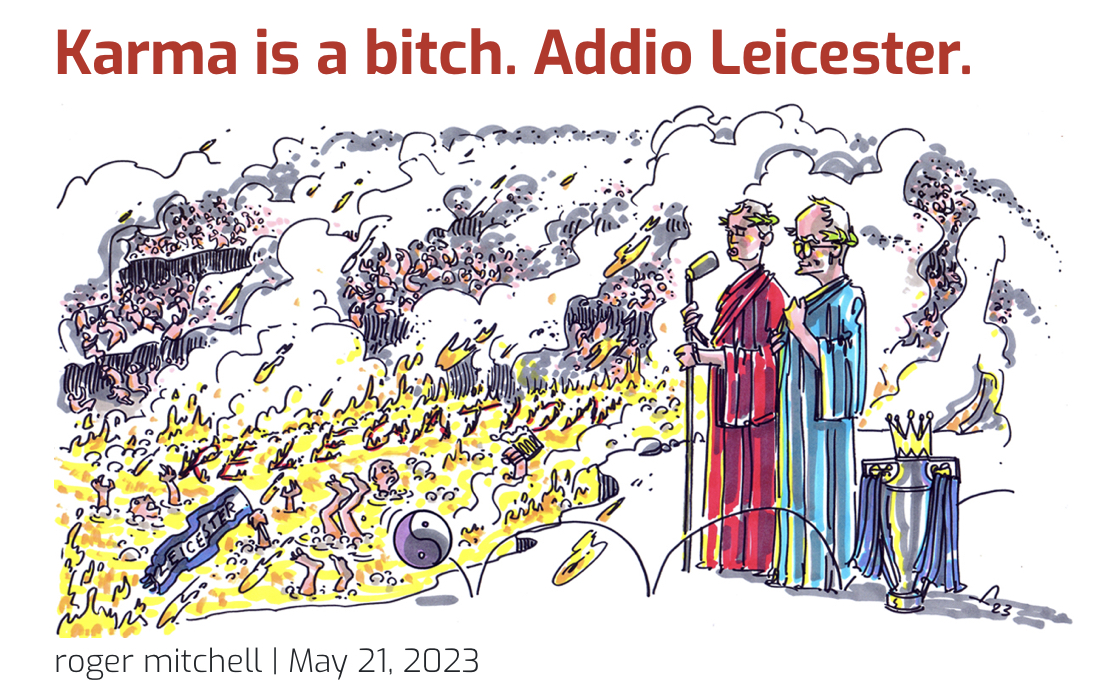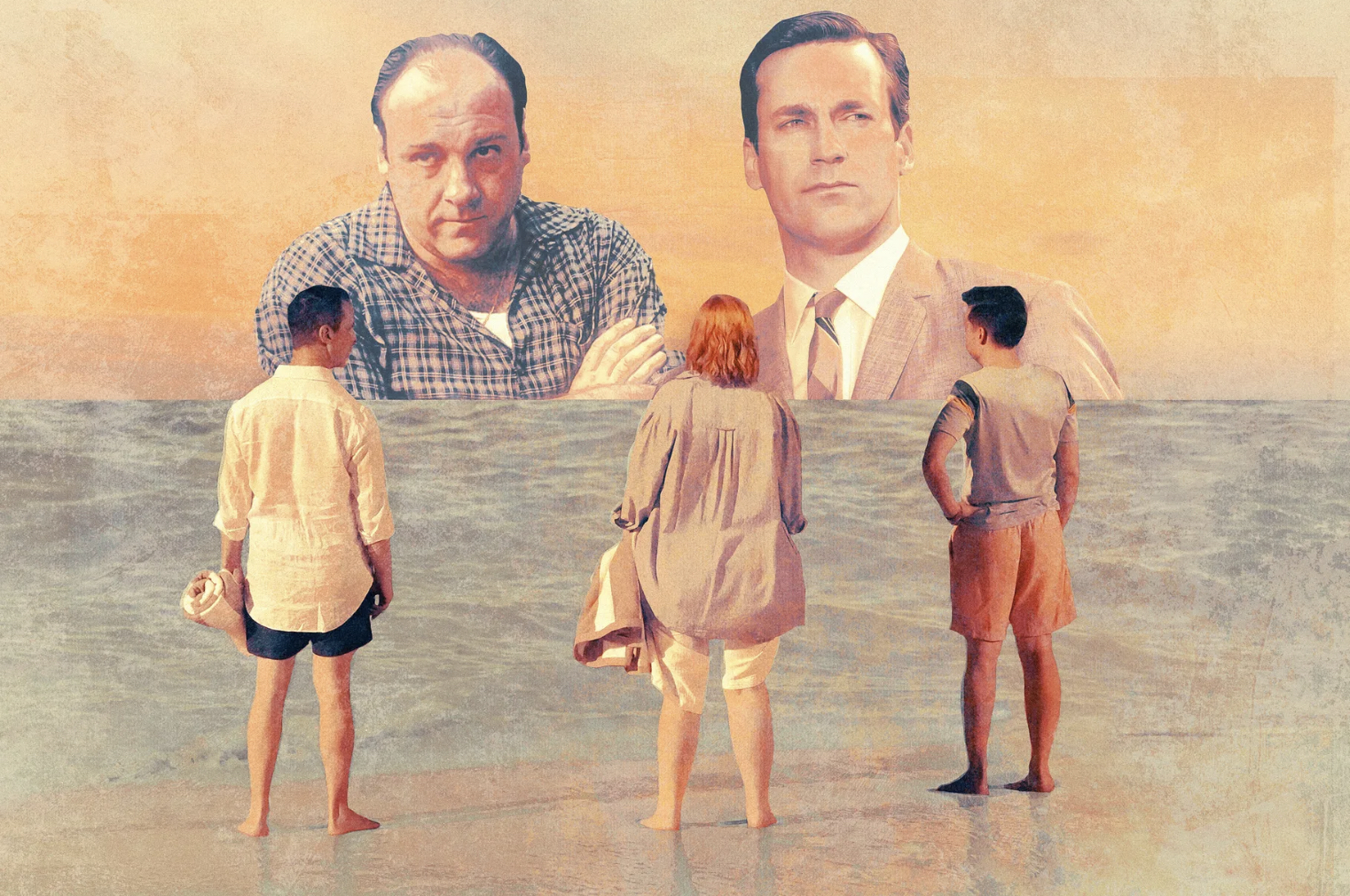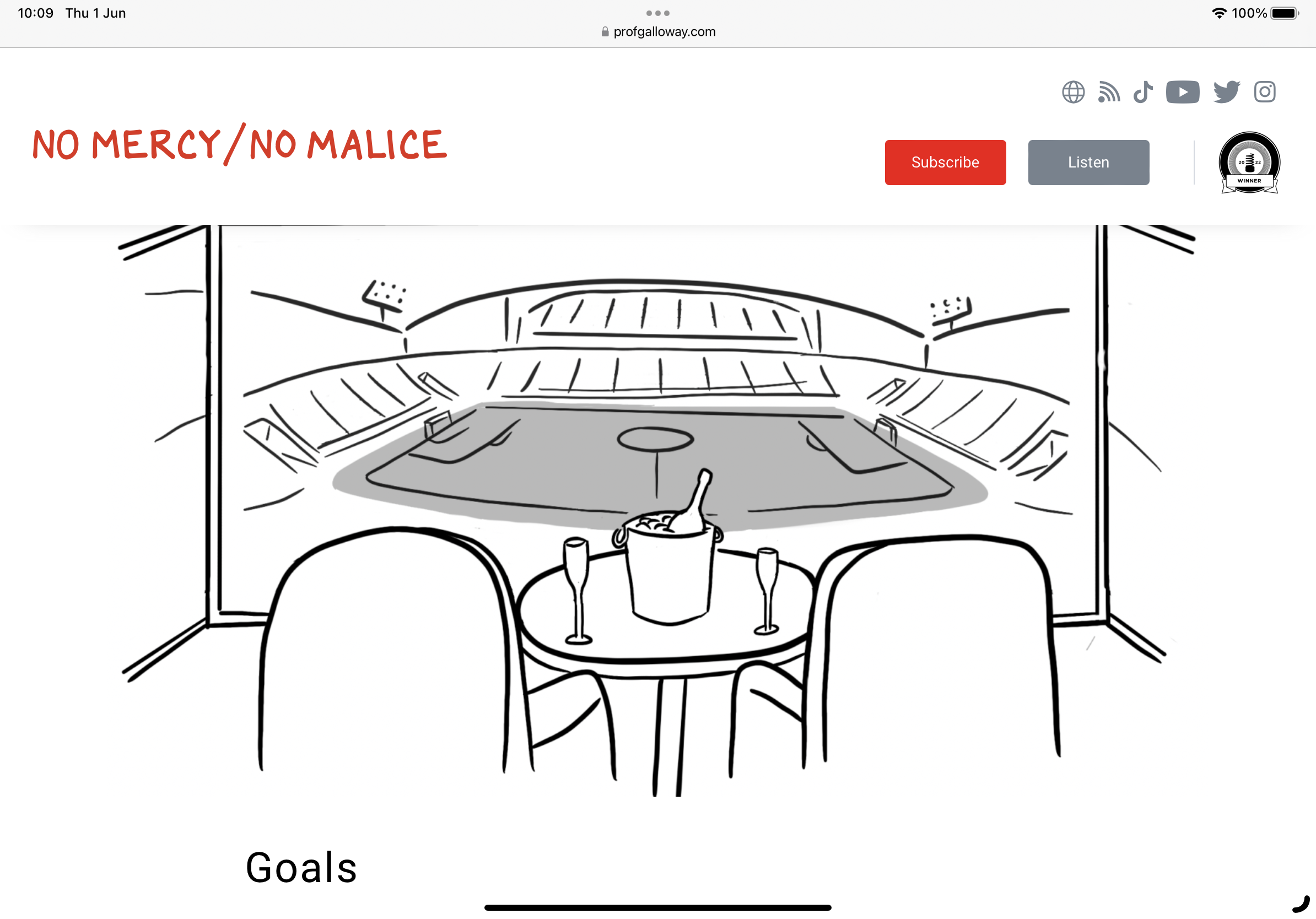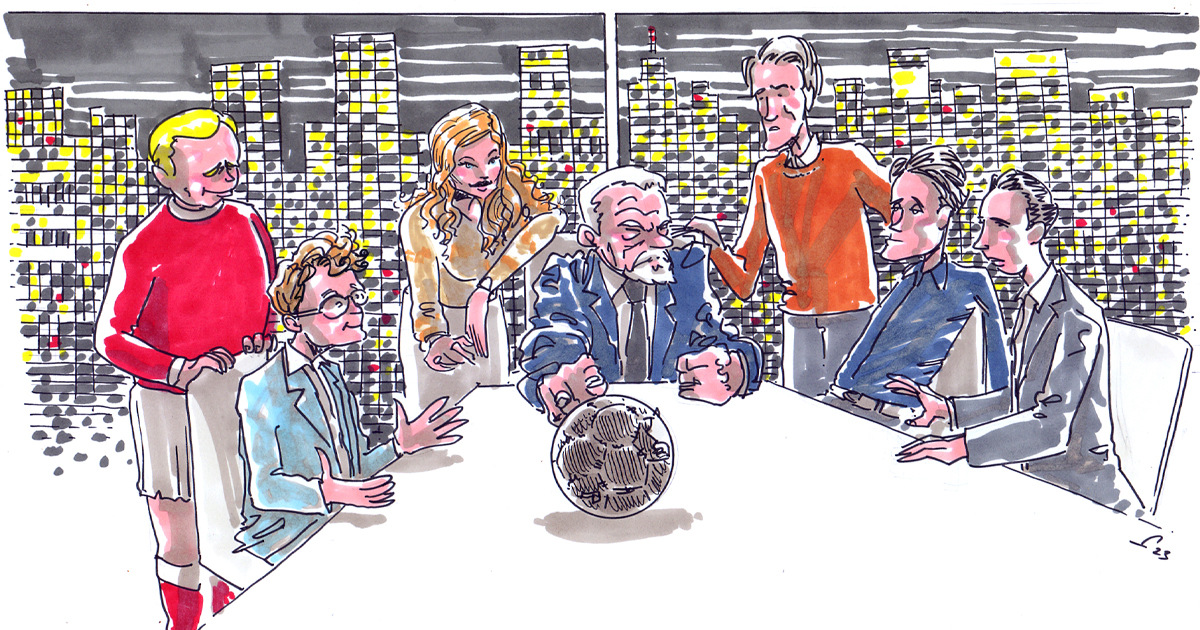Leicester did go down and karma had its pound of flesh. Yeh!
That Column a couple of weeks ago, ended with an open question:

The cost of keeping the tradition of relegation is crippling. Just killing sport. So we can’t have it both ways. And, at some point, we have to work out a solution to all this. Do we want a semblance of stability with which to build a healthy industry, or do we want to keep relegation as our raison d’être, because it is who we are, cost what it costs?
This is undoubtedly, the Rubicon in sport. Our biggest decision.
After some amazing sporting excitement last weekend, I felt a need to address all this personally. engrossed by the drama, from Sheffield, to Luton/Coventry, Everton, and Hamburg. The day after, I saw the finale of Succession, and the Greek tragedy of the Roy family.
As this is a sportsbiz column, most readers will likely already know everything of this saga surrounding the Waystar media conglomerate. If you dont, here is a great summary.

European football is easy to summarise, and if I had only 10 seconds in a room in front of the Roy family, to explain it as an asset class, I envisage my one line to Logan like this:
“Irrational competition for talent removes all marginality, making it irredeemably volatile and totally unsustainable.”
Logan, I suspect, would get that in a flash. For his kids, you’d need more time explaining:
Unlike American leagues, where franchises all collaborate to make the pie and the profits bigger, Europe is a dog eat dog death-match competition between clubs. The way you compete is buying the best players, and this naturally generates an arms race for talent, which ultimately destroys any profitability in the clubs. Ambition and desperation makes them spend monies they just don’t have and, in fact, all the revenues end up in the pockets of players. In this, the temptations and terrors of promotion and relegation are exactly what you don’t need. It’s the worst possible set-up, creating absurd risking taking and horrendous consequences. Players and their agents are laughing their heads off at our stupidity.
“Ok, Ok, that’s cool…”, Kendal may reflect. “…But dude, uh, how did they fuck that up so bad?”
You’d continue…
The revenue growth in the last 30 years has been astonishing, and should have been boom times for football as an asset class. But clubs all still lose biblical amounts of money. They excuse themselves from fixing this, under the banner of “tradition”. Football fans are part of the problem. Saying this is the nature of the game, and clubs in fact aren’t meant to make any kind of financial return. Fans, with their passion, demand this insanity, but then don’t see the irony when they bitch about their clubs going bust, and being taken over by dubious characters with dodgy 5 o’clock shadows, and a rap sheet at Companies House.
It’s naivety at best; and hypocrisy at worst.
Logically, if they don’t want their club to be vulnerable to carpetbaggers, “wrong ‘uns”, rich Arabs and oligarchs, then they shouldn’t goad them to get into that position in the first place.
Instead of demanding probity and prudence for their club, these glorious fruitcakes scream from the bleachers that the team needs to spend more and more, and must pay popular player X “whatever he wants”. They call the EFL Play-offs the richest game on earth, but it’s a poisoned chalice. Three of the recent winners were relegated soon after and still haven’t made it back. Derby County lost the 2019 final and went bust, now play in the third tier, and its carcass has been picked over by myriad spivs.
“Uhuh, uhuh, got it, that sounds perfect for Stewy”, Kendal concludes, looking for approval from his father.
But that’s too much for the old man, who screams at his hapless son, forever a lightweight disappointment:
You idiot! As a business vision, European football is a fucking basket-case of stupidity. Every fresh penny they make, whoring their product out, is pissed away the same day. It’s a dick substitute for billionaires wanting the fame and relevance that a bank account won’t give them. Wealthy bad actors spunking the topline up the wall on players, like Imelda Marcos in a Gucci store. That obliges everyone else to do the same, with insolvency the inevitable bastard child of their relegation/promotion. Even Connor could see all this.”
Silence!
Roman subconsciously edges himself closer to his father, as always in moments like this.
Here, instead, is a more reasoned and sophisticated take-down from the American influencer Prof Galloway. He doesn’t often write on sport, so it caught the eye.

A sports franchise is the most conspicuous consumption imaginable. A nice car and a house mean you’re prosperous. A plane makes you interesting. Owning a sports team cements you as fucking fascinating. Just as crypto and SPACs were driven by Greater Fool Theory, sports teams are driven by Greater Fear of Death Theory. A Lamborghini impresses the valet; a sports team impresses Kim Kardashian. And there are a lot of wealthy men arriving at the realization that biology is unimpressed by their money. So they spend it on their last meal of sorts: a sports team… The rise of influencer culture and the monetization of fame has also increased the value of sports teams to celebrities, as they can leverage their own brand to promote the team (referring to Wrexham et al)… sports have always had an inherent value that’s singular in a world of sameness. There are few greater hedges against technological disruption than sports.
Damn him, all that is really good, with sweet turns of phrase. Clever guy, now approached to be part of investing into sport.
He sees that as what Pippa Malmgren, leading political adviser to presidents and CEOs, would call a “signal”.
Galloway again:
It’s become increasingly clear that I am the canary in the business media coal mine. Vice, Bloomberg Quicktake, CNN+, and BBC+ all offered and began production of TV shows centered on an angry professor (him). At least three of those networks are dead. When networks are so overinvested, they’re calling me, it means the air has become noxious and you need to escape the mine. Similarly, if I’ve been asked to bid on sports teams, we may be at the top.
Sure, this is faux modesty, but this wonderful article gives three or four compelling non-business reasons why investing and managing in European football will never ever be the most disciplined or rational.
Open leagues in Europe are beautiful, and utterly our DNA, but they are destroying us. The status quo hasn’t been working for a while, causing so many instabilities in the whole system. Rugby, the same.
All of this has been the basis of my own thesis of inevitability in the direction of travel. Many think you can find a balance in European football. Keep open leagues, and all the tradition, but yet still control the market forces.
Logan would say: “I love you all, but you are not serious people. There is nothing more stupid than selling everything you have, for money that you don’t even get to keep.”
There it is, in all its simplicity: selling your soul for money you don’t even get to keep.
The whole glorious system today is a horrendous half-in, half-out compromise; set up to lose. And no-one calls this out, because of “tradition”.
This is indeed the Rubicon. Are we going to cross the river, as we must? We need to make a decision now, to either go full American closed leagues, or full Corinthian Kes. It’s maybe already too late.
Kes is everything about what is in my generation’s blood about this game. It is a look at the pure soul of British football. So maybe we should just go back to that?
Just stop chasing revenues we don’t even get to keep.
That would be the why.
What about the how?
If we choose Corinthian Kes, how do we reverse-engineer 30 years of following the money?
This is what I would do.
Stage 1
- Prevent clubs paying all their money away, by introducing some kind of very hard salary cap. Not a soft version, not a percentage of revenues, a fixed maximum amount all teams can spend on players. This obviously changes depending on what division you are in, and you legally construct player contracts to allow you to flex the cost when you get promoted or relegated. Sure there are some micro problems with this, but there are a lot of smart people in sport, loads of benchmarks like F1 budget caps. to observe. You just need the political will to do this. Take the power back from the players. Leagues would thus be very balanced, as clubs would have very similar budgets to spend. You’d only win by better operations, youth development, recruitment, coaching, squad planning, team-building. The way it was for Shankly, Clough and Stein.
- Reduce the financial gap in revenues between different leagues. This is what is wrong with the EPL/EFL today. Trying to navigate a transition, in either direction, between these two tiers, is like trying to make the jump in Bane’s pit in Batman. It’s too binary, with certain death if you fail. We would need to make open leagues less polarised, with smaller financial steps up and down.
At this point, you have put serious profitability into the football industry, through simple cost control.
You have also made the pyramid steps approachable and gradual. Sounds easy, but things in sport never are. They are emotional and political.
What needs to happen to deliver points 1 and 2?
- Merge the EPL/EFL. Merge Serie A and B, etc.. It is almost impossible to attempt to manage the difficulties of open leagues, with promotion and relegation, in different legal organisations. So bring them back together.
The weakness of today is that in England, teams changing leagues are also changing governing body and legal entity, EPL to EFL and vice versa. Both of these are private members clubs where the respective leadership of both has a legal duty of stewardship only to whomever is their club in that moment. I lose Leeds, I get Luton. I have to pay Leeds a parachute payment, but apart from that, I cast them to the wind, and Im off to see Gary Sweet at Luton to make him a friend (I’ll need his vote one day soon).
Stage 2
- Merge the leagues with the FA. Similar to other sports, football’s whole club versus country thing needs resolved. The strength of US sports isn’t just closed leagues, but simple dictatorial governance thru one Commissioner. Why? Because there can’t be a serious joined-up strategy for a sport when the FA and the Leagues are in competition for calendar and revenues.
I’ll be very very honest here; the FAs are the “daddy” of the game in name only. It’s the big clubs that call the shots, everywhere. All of us who have run leagues know what our job was: to elegantly drag power and money away from the FA, away from the amateurs, the old farts. We threw them only the crumbs, the minimum we could get away with. Every day a zero-sum game, a power play, a war. This was my specific job, for the club shareholders who employed me. National cup competitions were deliberately downgraded. Friendlies were eliminated. The FA Committees that mattered were to be filled with our appointees.
I can only speak for myself, and I admit I did all of that also with a certain gusto. It suited me.
But wars consume precious resources and energy. Those days are now redundant.
This vision is utterly political, where the big clubs’ immediate reaction would be horror, hating going back into rooms with the butchers, bakers and candlestick makers.
That’s why they broke away in 1992 in the first place.
But they can be convinced, and this is the pitch to them to bring them to the table:
“Look, we are all competing with each other to make ever bigger revenues with more games and infighting. That’s stupid because it benefits no-one but the players. Let’s agree to collude with universal salary caps, that give the sport itself the benefit of all this revenue that we’ve grown in these 30 years. It’s not as if doing this hurts your bottom line; your bottom line is already a busted flush. You are full of debt…
..We have been fools. We have made our industry and sport weak, and ceded control to people who don’t think like us. Nation states for soft power, Americans who believe in closed leagues. Let’s start to fight back and end this, merging under one governing body, one army, and all push in the same direction for the game we love. With a serious plan. The game was invented here; it is ours. So it is our duty to save it.“
The politicians would love this. It’s hitting a moment where so many struggling working class people are feeling evermore a need for community and belonging. As I watched the emotion of Luton Coventry, I said to myself: the time is right for this. Football is utterly populist, and vote winning. The politicians will close an eye to you acting like a cartel to suppress wages (which is what you’re doing).
The average footballer wage in the 80s was 10 times the average worker wage. Today it’s 600 hundred times.
That’s an easy PR battle to win.
Stage 3
- Deliver the Big idea. My personal vision for Kes is a simple insight and would be to formally classify football as the social and community asset it is. Football is a monopoly and, as such, it should be regulated as a “utility”, with a governing body that determines the reasonable “return” the owners should earn. The water, electricity, telecoms, rail industries are social assets, where market forces are controlled, and have to be. All monopolies have anti-trust parameters for a reason, with a regulator capping their returns. This type of work is formula based, well established, and isn’t radical as a concept. That’s the answer to save football in Europe. But self-regulation, not politicians.
Let’s show some examples in numbers. So let’s say it is a permitted 10% return on equity.
Say that the total annual revenues of English football (EPL/EFL/FA) is £5bn a year. For simplicity.
Today they are paying all that away in player costs of £5bn. And then some.
With a really serious wage cap, you reduce that to £3bn and that, at this point, is the risk capital deployed each year in football in England.
You allow clubs to make the agreed, regulated 10% return on capital. That’s £300m. (P.S.: that’s £300m profit more than they make today).
Doing this, the industry of football is creating excess annual profit of £1.7bn (5bn-3.3bn) a year.
One sole governing body, the merged leagues and FA, now have serious serious money to invest in what is our national game, and its communities. To take our game back to where it came from; the working class communities. Back to Kes.
Money for stadia, academies, facilities, community coaching, an elite performance institute, schools and women’s football.
Here is another huge win. That £1.7bn would allow football to get away from its fatal short-termism; to change its model to B2C; to develop its own direct relationships with its fans. Maybe even stop giving all its margin to other businesses. Do its own broadcasting hub, one place for fans to see the game. Not multiple subs.
Wait a minute. Not so fast. It can’t be as easy as this?
It’s not!
Good leaders look where their flanks are weak. Where you are going to get pressured, on the battlefield?
There are three big ones.
I
Loss of competitiveness in Europe
If I restrict my team’s budget for players, they won’t be able to compete in Europe. Any country with no similar hard salary cap would be able to outbid my clubs, and I may lose the best and most marketable players. My broadcast clients all over the world will maybe stop seeing the EPL as the greatest league in the world. My clubs won’t dominate in Europe, where there is big prize money to be had.
You would need to take the lobbying of your vision to Europe, to the superleague clubs, to UEFA, to make everyone play by the same rules. Even if it’s naturally in all their interests, and they are already moving in that direction with salary caps, see here, that is a Herculean task that would get to the level of the EU and FIFPRO.
But nothing worthwhile is ever easy. Political will.
II
Risk of big brand clubs being tempted to go rogue
The more I restrict my clubs, curtail their ability to build a “brand”, manage their revenue and cost lines, the more they are going to be tempted by a Super League.
Here is the siren song Big Finance would play to them:
“You are the big clubs, you are the box office, but this lot make you play with restrictions to benefit the small teams. They don’t give you the value you create in media. They stop you buying in the best talent, it’s the most appalling socialism. I can treble your income overnight and set you free to invest and spend as you wish, build your global fanbase. Remember you are a Director of your club, and that’s a legal position, where you are obliged to do the best for the owners of your club. If I offer you this, and you ignore it, make sure you are lawyered up to defend your own personal Directors liability.”
How to mitigate this? I’d go more stick than carrot. It’s a regulated industry, with political backing, so lean on them.
“If you challenge us in Supreme Courts under restraint of trade, we will pass tax law to take 95% of any profits you make.“
I would also offer the big clubs, and any club, a carrot. I’d allow them to monetise their fans as they saw fit, outside of the central League deals. All of that would go down to their bottom line, as they couldn’t spend it on players. I would however politically encourage them to use that money on making ticket prices always within the reach of the working person, to avoid vice sponsors like betting companies; and to fight racism.
III
Risk of the Players not accepting a cartel price-fixing their remuneration
If I am a top player, I’m not accepting this. It’s illegal. I’ll go and play wherever this wage cap isn’t in place. The MLS, the new Saudi league.
This ends up exactly where US sports are today; formal wage negotiations with a Player Union. My example above was offering players 60% (3bn/5bn) of revenues: that’s a negotiation. Its achievable.
So this is my vision to keep Kes, and have stable and sustainable open Leagues, with loads of money to invest in the community future of our game, and keep it affordable to its core working class base. Domestic Leagues would be balanced and exciting, with each team having a fixed player budget. Relegation and promotion is manageable. European competitions, operating the same way, finally can go back to the way they used to be, and not massively skewed to big leagues. Champions League for Champions only. The Celtics, Ajaxs, Benficas can live again on an equal footing.
Wall Street can still look to invest in European football clubs as a stable and predictable asset class, like a utility. They’d be regulated companies making a max of 10% ROE per year. I’d argue that’s more than they make today. This would be well suited to PE Infrastructure Funds looking for that yield. The biggest clubs would make more, if they got good at CRM. The wealthy price-insensitive investors could still bid for their trophy assets.
Big media would bid for the broadcast rights as today. But hopefully against a credible football Owned and Operated channel.
What would Logan say to all this?
“Son, I like you, you have the personality to have done well with me. But you are a socialist dreamer; the politicians will fuck this up. All you are doing is pushing all the talent to play in Riyadh and LA. Serious people never accept clerks curtailing what they can earn. So fuck off.”
My reply?
“Logan, our game is 150 years old. It is bigger than the odd player who only cares about maximising money. We are paying them 60% of our revenues, and if that’s not enough, then fuck ‘em. It’s the teams and communities that are important. The model may not work perfectly, but it is authentic and sustainable. Whoever succeeds, does it on merit.
But I’ll tell you more, old man! The only things that last, with true legacy, are never about money. You’re about to die, your family will lose the empire you built over a lifetime. Waystar will be broken up entirely within 3 years, by a nobody like Tom Wambsgans. Your kids are humiliated.
You failed Logan. Your mistake was that you never had anyone with balls to tell you when you were wrong. The best leaders surround themselves with people stronger and smarter than them. You should have listened to your brother. He knew. “

Listen to our “Are you not entertained?” sports management podcast here.
Let us also recommend our wonderful colleague John WallStreet. His daily newsletter here is essential reading, especially in its coverage of the US market.
To find out what we do in change management, have a look here.
For our C-suite management services, read here.
Here you can know more about our content development work.
Discover our Corporate Learning service.
Get to know more our “Sport Summit Como” yearly sports management event here.
If you are interested in our own story, check us out here.



